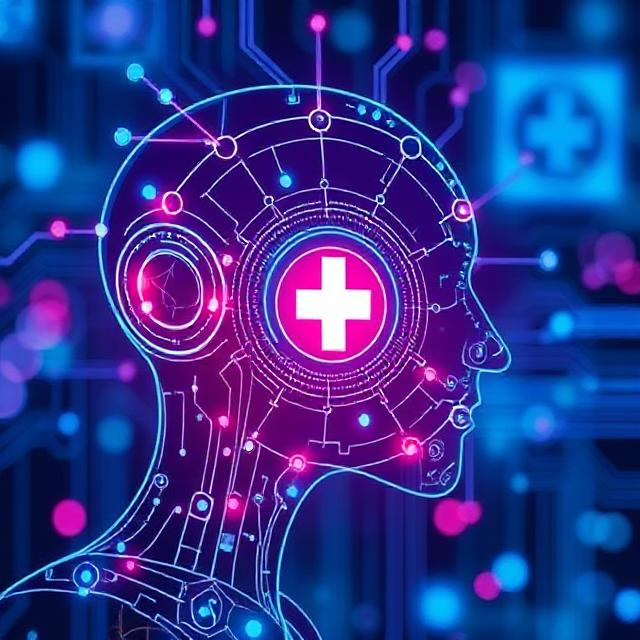AI in Healthcare: Revolutionizing Patient Care
AI in Healthcare: Revolutionizing Patient Care
Artificial Intelligence (AI) is transforming various industries, and healthcare is no exception. The integration of AI in healthcare is revolutionizing patient care by enhancing diagnostics, personalizing treatments, and streamlining medical processes. This article explores the multifaceted impact of AI on healthcare and its potential to revolutionize patient care.

Introduction
The healthcare industry is undergoing a significant transformation with the advent of AI technologies. AI’s ability to process vast amounts of data, identify patterns, and make predictions is reshaping how medical services are delivered. From diagnostics to personalized treatment plans, AI is enhancing patient outcomes and improving the efficiency of healthcare systems.
AI in Diagnostics
One of the most significant applications of AI in healthcare is in diagnostics. AI-powered tools are helping radiologists interpret medical images with greater precision and speed. These tools can identify patterns in medical images that may be difficult for human eyes to detect, enabling earlier diagnoses and better patient care. For example, AI algorithms can analyze X-rays, MRIs, and CT scans to detect abnormalities such as tumors, fractures, and infections.
Personalized Medicine
AI is also playing a crucial role in personalized medicine. By analyzing vast amounts of data, including genetic information, lifestyle factors, and medical history, AI can help healthcare professionals develop personalized treatment plans for patients. This tailored approach promises to improve the effectiveness of treatments, reduce adverse reactions, and enhance patient satisfaction. For instance, AI can identify genetic mutations that predispose individuals to certain diseases, allowing for preventive measures and early interventions.
Predictive Analytics
Predictive analytics is another area where AI is making a significant impact. By analyzing historical patient data, AI algorithms can predict potential health issues and allow healthcare providers to offer proactive treatment. This approach can help prevent costly interventions and improve patient outcomes. For example, AI can predict the likelihood of a patient developing chronic conditions such as diabetes or heart disease, enabling early intervention and lifestyle modifications.
AI in Drug Discovery
AI is revolutionizing drug discovery and development by making the process faster and more cost-effective. AI-driven platforms can analyze vast amounts of data to identify potential drug candidates and predict their effectiveness. This approach accelerates the development of new therapies and reduces the time and cost associated with bringing new drugs to market. For instance, AI can identify existing drugs that may be repurposed for new indications, speeding up the drug development process.
Operational Efficiencies
AI is also enhancing operational efficiencies within healthcare systems. Through automation and data-driven insights, AI tools are optimizing supply chain management, improving administrative processes, and enhancing resource allocation. These operational improvements lead to cost savings and allow healthcare providers to focus more resources on patient care. For example, AI can automate routine administrative tasks such as scheduling appointments and managing patient records, freeing up healthcare professionals to spend more time with patients.
Challenges and Ethical Considerations
While AI holds great promise for revolutionizing healthcare, it also presents several challenges and ethical considerations. One of the primary concerns is the potential for bias in AI algorithms. If the data used to train AI models is biased, the resulting algorithms may perpetuate existing disparities in healthcare. Additionally, there are concerns about data privacy and security, as AI systems often require access to sensitive patient information.
To address these challenges, it is essential to ensure that AI algorithms are developed and tested using diverse and representative data sets. Additionally, robust data privacy and security measures must be implemented to protect patient information. Ethical guidelines and regulations should also be established to govern the use of AI in healthcare and ensure that it is used responsibly and transparently.
Future Outlook
The future of AI in healthcare is promising, with ongoing advancements in AI technologies and increasing adoption by healthcare providers. As AI continues to evolve, it is expected to play an even more significant role in improving patient care and outcomes. Some of the emerging trends in AI healthcare include the use of AI for remote patient monitoring, virtual health assistants, and AI-driven telemedicine.
Remote patient monitoring involves using AI-powered devices to track patients’ health metrics in real-time, allowing for timely interventions and reducing the need for hospital visits. Virtual health assistants, powered by AI, can provide patients with personalized health advice and support, improving patient engagement and adherence to treatment plans. AI-driven telemedicine platforms enable healthcare providers to offer remote consultations and deliver care to patients in underserved areas.
Conclusion
AI is revolutionizing healthcare by enhancing diagnostics, personalizing treatments, and improving operational efficiencies. While there are challenges and ethical considerations to address, the potential benefits of AI in healthcare are immense. By leveraging AI technologies, healthcare providers can deliver more accurate, efficient, and personalized care, ultimately improving patient outcomes and transforming the healthcare industry.
As AI continues to advance, it is essential to ensure that it is used responsibly and ethically. By addressing the challenges and embracing the opportunities presented by AI, the healthcare industry can harness the full potential of this transformative technology to revolutionize patient care.
I hope this article helps you attract more views to your website! If you need any further assistance or additional content, feel free to ask.
